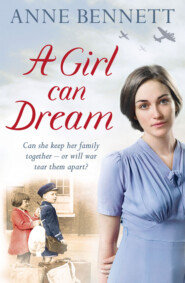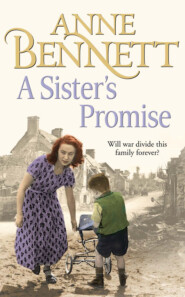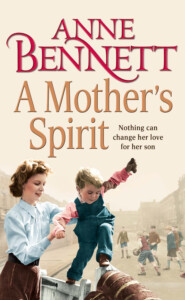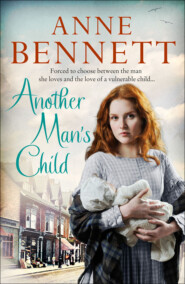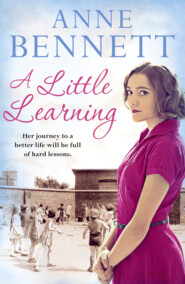По всем вопросам обращайтесь на: info@litportal.ru
(©) 2003-2025.
✖
Love Me Tender
Автор
Год написания книги
2019
Настройки чтения
Размер шрифта
Высота строк
Поля
So they were all happier, and Grandma said that, ‘Things are back to normal again, thank God,’ and only Lizzie was the slightest bit miserable. Her father worked long hours and any overtime going, and he got home too late and too tired to play with Lizzie and Danny as he used to. Often he was so late they were in bed when he got in and he had only time to give them a kiss. Danny had often fallen asleep, but Lizzie would wait, however tired she was, for her father’s tread on the stairs.
It was June now and almost Lizzie’s seventh birthday. Just after it, she would make her first holy communion. She knew most of her catechism and things were going along nicely at school, but no one at home seemed bothered. Who would make her dress, Lizzie wondered, or could she choose one, in the market? She imagined a veil with flowers on the band at the front like she’d seen others wearing. She longed for white sandals, which would be the prettiest shoes she’d ever had in her life, and white socks, so different from the grey woollen ones of winter and the bare legs of summer.
Eventually she broached the subject with her mother. ‘You’re neither having a dress made nor am I buying one; you’re having Sheelagh’s.’
‘Sheelagh’s?’ She was having to wear a cast-off from her hated cousin Sheelagh! Why hadn’t she thought that could happen? Her cousin was a year older than her and so had had her first communion the previous year. ‘And are the veil and the sandals and socks from Sheelagh too?’
‘Yes, and you can take that look off your face, miss, before I take it off for you,’ her mother said angrily. ‘I know your father’s working now, but there’s a lot of things we need and it’s silly to spend money on things Sheelagh already has.’
Lizzie knew she was right, but it made it no easier to bear. Nor did the party that her mammy arranged for Lizzie’s seventh birthday make it much easier either. She’d never had a party before, and the jelly and blancmange and tinned fruit had been delicious and she should have been thrilled. But across the table sat her hated cousin with a silly smile on her face that made Lizzie want to smack her. Sheelagh was a spiteful cat, and Lizzie knew what she was thinking, and she knew that she’d tell them all at school that Lizzie O’Malley was wearing her old communion dress.
But before long, Lizzie had more to worry about, and that was confession! Miss Conroy had let all the new communicants look in the confessional box, and of course they’d rehearsed and rehearsed all they would say, but that was nothing like the real thing.
The night before, she lay in bed thinking about it, and the more she thought, the more despairing she became. It was her first confession, and for that reason she’d had to examine her conscience not just for the last week or fortnight, but for the whole of her seven years. Lizzie decided there were a devil of a lot of sins you could build up in seven years, and she thought of all the bad things she’d done.
Disobedience – she wasn’t very good at doing as she was told. Not that she openly disobeyed her mother, or even her grandma – she might be bold, but she wasn’t stupid, and she had no wish to shorten her life. Forgetting prayers – oh, how easy it was to slip between the sheets at night if her mother and father didn’t come up straight away and make her kneel beside the bed. Then, when they did come up, Lizzie, not wishing to leave her warm bed, would often say she’d already said her prayers, so that was adding lies to it. And in the morning she was up and away and had started the day before she gave a mind to them, and then something more interesting would claim her attention if and when she did ever remember. Then there was fighting – she wondered if that was a sin; if it was, her soul must be as black as pitch, she decided, for she’d fought with Sheelagh for as long as she could remember.
And who would be hearing confession? It mattered because Father Flaherty was likely to give you a whole decade of the rosary for forgetting your prayers once, while Father Cunningham was much kinder and more understanding. But did you know who it was when they had the screen between them and you, and then voices were probably muffled in the box?
Lizzie decided she’d better not say she’d been too bad, for if it was Father Flaherty on the other side, she might spend the rest of her life on her knees. She’d say she’d been disobedient and cheeky and sometimes forgot her prayers; it would be better not to say she couldn’t be bothered sometimes. Anyway, three sins would do for now, Lizzie thought, as she curled sleepily in the bed. She had a mind it would take quite a few confessions to account for seven years of sins.
In the event it wasn’t so bad at all. They sat in the pews in the dimly lit church that was almost as familiar to them as their classroom, and shuffled down the rows, one by one, towards the confessional box in their turn. Strain as the children might, they could hear not a word spoken, just a tantalising mumble, and Lizzie was glad no one could hear the bold things she would tell to the priest.
Lizzie’s friend Maura Mahon told her that priests went blind into the confessional – it was well known, she said – and when you’d confessed, as soon as you left the box, anything you told them was wiped from their memory. Lizzie thought that very comforting, even if it was only Father Cunningham hearing the first confessions of the children.
Lizzie was given three Hail Marys and a Glory Be as a penance for the list of sins she told to the priest and Maura had the same, but Mairead Cleary had to say a whole decade of the rosary! Ask as they might, none of the children could get her to tell them what she’d said to be given such a heavy penance. Maura whispered to Lizzie she thought you’d get little more if you murdered someone and Lizzie was inclined to agree.
Certainly Mairead looked sorry enough as she knelt at the rails of the side altar with the statue of the Virgin Mary before her. She had her head bowed for a long time, but then one Our Father, ten Hail Marys and a Glory Be can’t be said in a couple of minutes. When Lizzie saw Mairead make the sign of the cross and then drop a coin in the box and light a candle, her eyes nearly popped out of her head; she’d never had money for candles.
‘She’s just making sure,’ Maura whispered. ‘She’s lit a candle so that Our Lady will put in a good word for her with God.’
‘She must have done something desperate, all right,’ Lizzie said with awe.
Her mammy had always said the Clearys were a funny bunch. She said it was strange these days to have the money they seemed to have to splash about when never a one of them appeared to be in work to earn it.
But all the same – a whole decade of the rosary…
The Saturday night before Lizzie’s first communion was the same as every other Saturday night as far back as she could remember. Her mammy would fill the boiler in the cellar early in the evening, and later her daddy would lift the large tin bath from the hook on the back of the cellar door and fill it with buckets of water from the boiler and cold from the tap so that Kathy could bath the children and wash their hair. Lizzie loved her bath, though in the winter the cellar was freezing. Now that her daddy had got a job, he’d bought an old oil stove which stank like mad but at least made the place warmer.
Lizzie was particularly glad to have her hair washed if she’d had stuff put on it to kill the nits. Every Friday night she had to sit over a newspaper while her mother attacked her with the nit comb, and if any were found, smelly lotion had to be put on her hair, and on Danny’s too, and left all the next day, and it stank worse than the oil stove.
That Friday night, nothing had been found in Lizzie’s hair, but her mammy gave it a good washing anyway to make it shiny. Then she carried Danny upstairs, and Lizzie’s daddy came for her with a towel he’d been warming by the fire while her nightclothes were draped over the guard to air.
Lizzie glanced over at the communion dress hanging from the picture rail. She knew her mother had washed it and starched it before ironing it to take some of the limpness out, and it looked quite pretty really. Kathy knew something of her daughter’s feelings; she’d been the eldest in her family and had had a new communion dress that later had to do for both her sisters – Maggie, who was six years younger than her, and Carmel, the baby of the family – and the same with the confirmation dress a few years later. It would have been nice to get Lizzie a new one, but such a waste with Sheelagh’s just lying there. It wasn’t as if they had another girl in the family to pass it on to either, though there would be one more O’Malley before Christmas, for since her sex life with Barry had resumed in February, she’d not had a period.
‘Do you like it, pet?’ she asked Lizzie.
‘Yes, yes, I do, I just wish it hadn’t been our Sheelagh’s.’
‘Now, Lizzie.’ But Kathy, though she rebuked her daughter, knew what she meant for, God forgive her, she didn’t like the child either, and was less than keen on her mother, Bridie.
She often wished Pat wasn’t quite so easy-going, for he’d allowed himself to be led down the aisle by that Bridie Mulligan, and everyone knew what she was. Sheelagh was one in the same mould, and yet Pat was the gentlest, most considerate and pleasant man you could wish to meet.
There would be no more children in that family, if you could go by what Bridie had told her. After Matthew was born, three years after Sheelagh, she’d said Pat would have to tie a knot in it, for he was not getting near her again. Kathy had been shocked, because even though she and Barry were having their own problems, those were connected with Barry having no job. Yet Pat had been steadily employed, and Kathy was sure it was wrong to be cold-bloodedly planning your family that way; it might even be a sin. Still, Bridie could well look after her own immortal soul; Kathy had enough worries of her own.
Lizzie felt like a princess, and as she glanced along the row, she knew her dress was just as nice as all the other communicants’. She’d discovered that most girls with older sisters or cousins had handed-down dresses like hers, and not all the mothers had done such a good job as Kathy at making them look like new. And it was far better than having a dress loaned to you by the school, as some did if their families were really poor. Lizzie would have hated that.
Really, she thought, no one would have known her whole outfit wasn’t new, for the dress and veil were sparkling white and her daddy had put white stuff on the sandals to cover any scuff marks. Her mammy had bought new white socks in the end, for she said Sheelagh’s had gone a bit grey, and that morning she’d given Lizzie a missal with a white leather cover that was so beautiful to look at it was almost a shame to use it. Her grandma had given her a new rosary as she entered the church, and now she played it through her fingers and attempted to pray.
But she was too excited to concentrate and couldn’t help feeling sorry for the boys sitting the other side of the church, for all they had were the white sashes loaned to them by the school. Their shirts were white, of course, and she guessed a fair few were new, but they looked very drab next to the girls in all their finery.
Lizzie’s tummy rumbled as she’d known it would, for she’d not been able to have anything to eat or drink that morning as she was taking communion. It was only right, for she knew the little round tablet was not bread but the body and blood of Jesus Christ. It was a miracle, the priests said, that happened in the mass. It always made her feel a bit sick, that thought, but she never told anyone, they’d think her awful. She felt sick now too, waiting to take communion for the first time. Probably, she thought, it was because she was hungry, and she’d feel better when she had her breakfast in the school afterwards.
Lizzie knew the family would all be there for her that Sunday morning. In one way she was glad, but on the other hand, she knew that if she fidgeted too much, or looked round, or dropped her collection pennies, she’d catch it later. She knew where they all were, for out of the corner of her eye she’d seen her Auntie Maggie and Mammy and Daddy arrive with Danny between them, and all the others behind them. She glanced round once to smile, but her mammy made an impatient gesture with her hand that Lizzie knew meant for her to turn round and face the front. She did, but not before she saw Michael and Carmel, who Lizzie felt were too young to be called Uncle and Auntie, grinning back at her. Carmel was only twelve and could remember her own first communion; she knew how Lizzie would be feeling, and how her empty stomach would be churning at the enormity of it all.
Kathy watched all the earnest young communicants and hoped that it was a safe world they were growing up in. The news she listened to on the wireless at her parents’ house was disturbing, as it was in the newspaper Barry had taken to bringing home in the evening. She knew that there was great trouble in Germany. Barry had explained that Hitler seemed to want to own the whole of Europe, and they weren’t making guns in the quantities Barry said they were making them just to put in some vast storehouse. She said a fervent prayer for the safety of her family, especially Barry, Lizzie, Danny and the unborn child she was carrying, and as the strains of the organ filled the church and she stumbled to her feet for the first hymn, a chill of foreboding ran through her body.
TWO (#u8da00b38-980b-59b4-ae84-f21bfeb441be)
Lizzie wasn’t sure exactly when she became aware over the summer holidays that something wasn’t right and that all the adults were worried. In the main, it was a holiday like any other; when the kids in the street got fed up of skipping and playing hopscotch and hide and seek and other street games, they would start to complain and fight and get under their mothers’ feet. Then Carmel and girls of similar age would be pressed into service to take the children off to Cannon Hill, or Calthorpe Park, with a couple of bottles of tea and jam sandwiches to stave off hunger till teatime. It had been Carmel’s lot to look after her cousins and their friends since she’d been nine years old, and much as she loved them, she often resented it. Sometimes she thought it was no good having a holiday if all you did all day was mind weans. She also knew it was no good saying anything about it and that lots of girls were in the same boat, so she usually went without complaining.
Lizzie thought at first that everyone was worried about her Auntie Rose, who was on her time again and little Pete only just two and Grandma said she was not having it easy. Then she thought it might be the row going on because her Auntie Maggie wanted to marry Con Murray and Grandma and Grandad wouldn’t have it. Not only was he just a bookie’s runner and not good enough, in their opinion, for Maggie, but he’d been put in prison for it too, and Grandad said no daughter of his would marry a jail bird.
Later, at home, she heard her parents discussing it. Barry said Con wasn’t a jail bird really; all he did was place bets, and he at least felt sorry for him, he only did it because he couldn’t get a decent job.
‘It doesn’t matter what you say, Daddy won’t let her marry him,’ Kathy said. ‘He can’t provide for her properly as a bookie’s runner.’
‘I couldn’t provide for you for many years,’ Barry reminded her.
‘Aye, but you could when I married you,’ Kathy said. ‘And you’d never been inside.’
‘No, but I can’t blame the man, not totally,’ Barry said. ‘Anyway, so I hear it, when the men are put away, the firm, the people he places bets for, see to his family.’
‘Oh, I’ll tell Daddy that,’ Kathy said sarcastically. ‘I’m sure it will make all the difference! He’d have a fit if he thought his daughter, and possibly grandchildren, was being kept from starvation by people he’d consider not far removed from gangsters. Couldn’t you ask round at your place?’ she appealed. ‘Maybe Con could get set on there?’
Barry shook his head. ‘I doubt it, but I’ll ask. In the meantime they’ll have to wait. After all, once Maggie is twenty-one, she can do as she pleases.’
Kathy wondered if her headstrong young sister would be prepared to wait, for she was just nineteen, and two years seemed a lifetime away. Only the other day, she’d said to Kathy in a voice laced with a veiled threat, ‘I could always force their hand, you know.’
‘Don’t be a bloody fool,’ Kathy had snapped. ‘Don’t suggest bringing a child into this mess till you have something sorted.’ She looked at her sister and asked, tentatively, ‘You haven’t…you don’t…’
Maggie had tossed her mane of black hair so like her elder sister’s, flashed her eyes that had a greenish tinge to them and snapped, ‘That’s my business.’
‘Maggie, you’ll get your name up.’
‘Don’t be such a fool. Con loves me.’
‘You’re the fool! If he loved you, he’d wait.’






